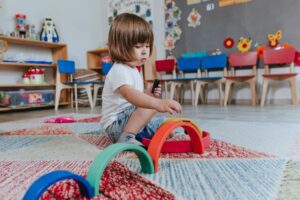Here’s How Consistent Routines Support Emotional and Developmental Growth
Children with autism thrive in structured, predictable environments. A well-established routine provides a sense of security, reduces anxiety, and helps with daily transitions. Because many children with autism struggle with unexpected changes, having a structured day can make a world of difference in their ability to manage emotions, communicate, and engage in learning.
At Phoenix Autism Center (PAC), routine isn’t just a concept—it’s a foundation for success. Founders Justin and Bre Hartman built PAC with their own experience in mind, understanding firsthand how crucial consistency is for a child with autism. Their journey as parents inspired them to create a center that reinforces the power of structured learning, helping families create routines that work both in therapy and at home.
Why Routine Matters for Children with Autism
Children with autism often process the world differently. They may struggle with unpredictability, find comfort in repetition, and need extra time to transition between activities. A predictable routine helps by:
✔ Reducing Anxiety and Meltdowns – Knowing what to expect helps children feel safe and in control, minimizing stress.
✔ Improving Behavior and Self-Regulation – Predictable routines create stability, reducing behavioral challenges related to uncertainty.
✔ Enhancing Learning and Skill Development – Repetition and consistency reinforce learning, helping children build new skills.
✔ Supporting Independence – With clear expectations, children become more confident in managing daily tasks.
How to Create a Supportive Routine at Home
Establishing a routine doesn’t mean a rigid schedule—it means creating predictability with flexibility to meet your child’s needs. Here’s how:
Establish Consistent Daily Routines
Start by creating a structured flow for the day, including wake-up, meals, therapy sessions, playtime, and bedtime. Keep key activities at the same time each day to build predictability.
💡 Example Morning Routine:
✔ Wake up and get dressed
✔ Eat breakfast
✔ Brush teeth
✔ Engage in a preferred activity (sensory play, reading, or quiet time)
✔ Transition to therapy or school
Use Visual Schedules
Many children with autism respond well to visual supports like picture schedules, charts, or digital apps. These tools help them understand what’s coming next and ease transitions between activities.
📌 Tip: Try first-then charts (e.g., “First brush teeth, then play outside”) to motivate participation in daily tasks.
Build in Transition Cues
Changing from one activity to another can be challenging. Help ease transitions with:
- Timers or countdowns (“Five more minutes, then we clean up”)
- Verbal warnings (“After snack time, we will get ready for bed”)
- Music or movement cues (a song that signals bedtime, a specific hand clap for “time to go”)Allow for Flexibility
Allow for Flexibility
While structure is crucial, children with autism also need to learn to adapt to small changes. Introduce slight variations in routines gradually, using social stories or practice runs to help them adjust.
🛠 Example: If dinner is always at 6:00 PM, occasionally shift it to 6:15 PM and let your child know in advance. This helps build resilience to change over time.
How Routine Supports Success For Children With Autism at PAC
At Phoenix Autism Center, structure and routine are key components of therapy. Each child follows a carefully planned schedule tailored to their needs, helping them feel comfortable and engaged in their learning process. Therapists use consistent routines, transition strategies, and visual supports to ensure children gain confidence in their daily interactions.
For Justin and Bre Hartman, routine was an essential part of their own child’s development. They saw firsthand how small, predictable habits could create big breakthroughs in communication, behavior, and learning. That’s why PAC focuses on structured interventions—because they know what works.
Ready to Learn More?
Routine and structure provide a strong foundation for children with autism, giving them the predictability and confidence they need to succeed. By implementing consistent schedules, using visual supports, and preparing for transitions, parents can help their child navigate daily life with less stress and more success.
If you’re looking for personalized support in building structure for your child, Phoenix Autism Center is here to help. Our therapy programs are designed to create stability while fostering independence. Contact us today to learn more about how we can support your family.




